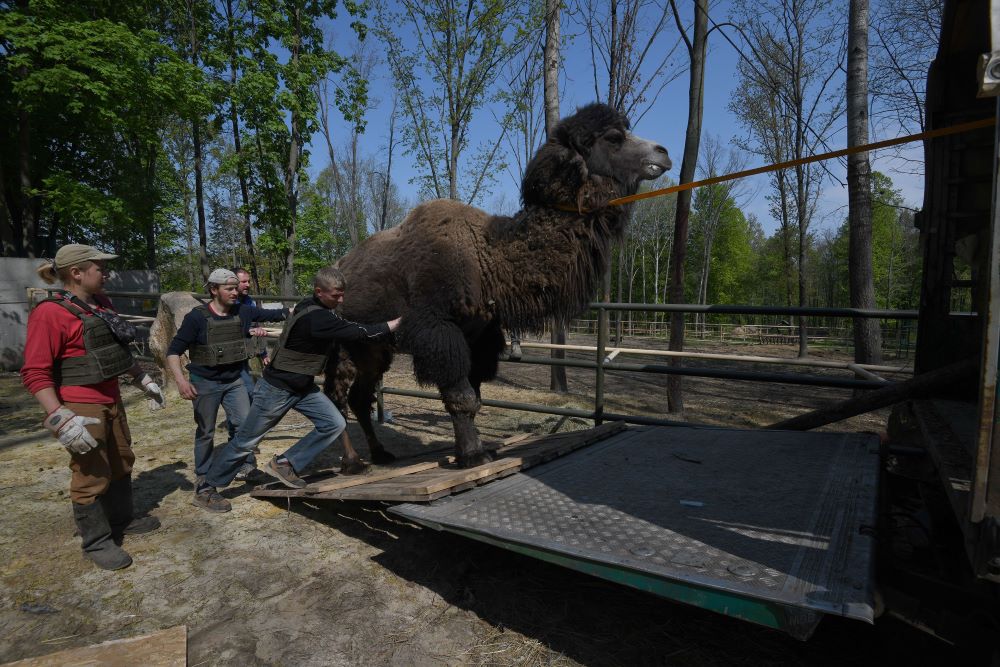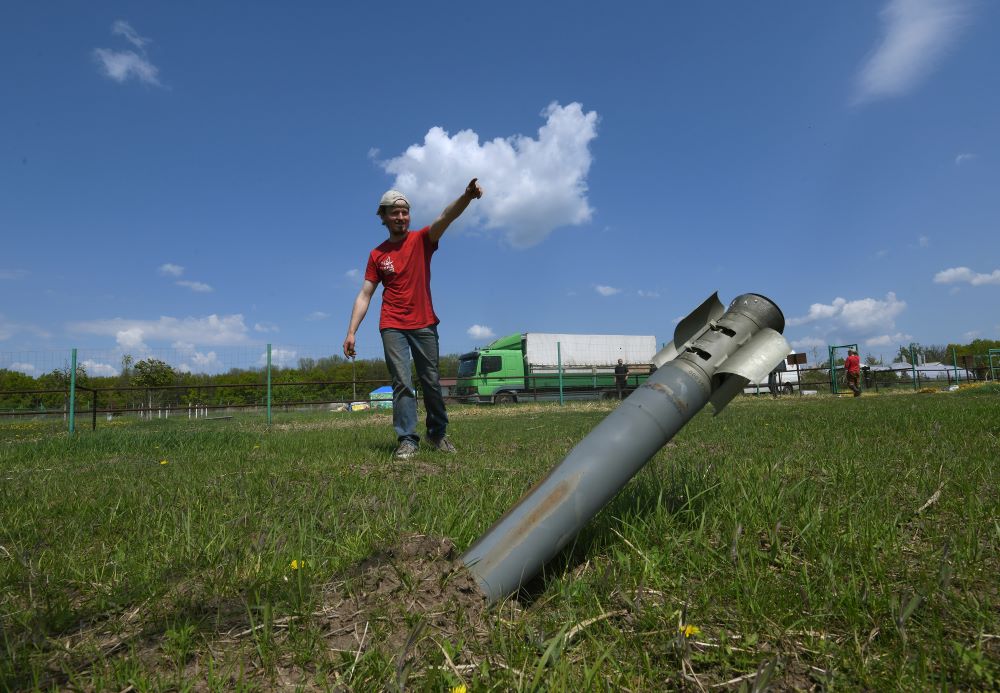
Eugene, a volunteer at Feldman Ecopark near the Russian border in Ukraine, helps push one of the zoo's massive camels onto a truck so that he can be evacuated. Joshua Zeman's "Checkpoint Zoo" tells the story of how zoo staff and volunteers tried desperately to keep the animals alive after Russia invaded Ukraine. (Carol Guzy)
"Checkpoint Zoo" begins with what sounds like a wartime rescue — voices of people unseen urge speed as rockets hit nearby, rendering the already jerky handheld camera images difficult to comprehend. As the scene clarifies, viewers discover people rushing through the warzone, carrying something on a stretcher. But it isn't a human being. It's a sleeping lion. And their urgency is not simply about getting to their vehicle uninjured, but before the creature wakes.
When Russia invaded Ukraine on Feb. 24, 2022, one of the most immediately and irrevocably impacted locations was a beloved Ukrainian zoo located close to the Russian border. The passion project of Ukrainian millionaire and politician Oleksandr Feldman, Feldman Ecopark had a staff of 100 taking care of more than 5,000 creatures, including farm animals and the only pair of tapirs in Ukraine ever to become parents.
The initial Russian surge into the area saw tens of thousands flee, including 90% of the zoo's staff. And the quick rebuff of Russian forces only made the situation worse for the ecopark, which found itself permanently trapped in the no-man's-land between Russian and Ukrainian forces.
In "Checkpoint Zoo," filmmaker Joshua Zeman ("The Loneliest Whale: The Search for 52," "Cropsey") weaves together footage he and the few remaining zoo staff shot as they tried desperately to keep the animals alive and fed despite no heat, no power, no running water and the constant threat of attack.
At first the zookeepers and volunteers find the situation nearly impossible. Freezing temperatures have shivering animals pressed together to try and keep themselves warm, while the frequent shelling has the predators out of their minds with fright. Within days Russian soldiers show up and kill two of the remaining staff. Later, another staff member is attacked and killed by one of the overwrought lions.

Timothy, a volunteer for the evacuation of the animals at Feldman Ecopark, helps direct the high-risk rescue amidst the debris of Russian missiles. Joshua Zeman's "Checkpoint Zoo" tells the story of how zoo staff and volunteers tried desperately to keep the animals alive after Russia invaded Ukraine. (Carol Guzy)
But after Feldman Ecopark director Vitalii Ilchenko goes online to beg for help, unexpected hope arrives in the form of Tymofii Kharchenko, a cheerful young veterinarian who shows up at the park unannounced and begins taking care of the animals. He recruits siblings and friends to join him, telling them, "You will remember this for the rest of your life."
Part of what makes "Checkpoint Zoo" such a compelling story is the sheer delight that Kharchenko, his friends and the remaining staff take in caring for these animals. For a moment, the danger of their environment fades before their happy love. But this Eden is short-lived. When a shelling attack hits the monkey house, causing eight apes to die of heart attacks, Feldman realizes that the zoo is not sustainable.
In the second half of the film, he and his staff struggle to figure out how and where to evacuate 5,000 animals. In a Doctor Doolittle-like twist, Feldman ends up taking thousands of the creatures onto his own ample property, until not just the fenced in outdoor areas but also every single room and hallway in his house has animals living in it. Feldman recalls going to the bathroom one night and almost getting attacked by the nocturnal caracal that now lives there.
The most difficult challenge, of course, is dealing with the zoo's predators. The zoo simply does not have the resources to transport or sedate them. And finding homes for them has proven impossible. Confronted with the possibility that he will have to kill the animals, he, too, goes online. And almost immediately he and the zoo's staff are inundated with phone calls from around the world offering assistance including cages and trucks and homes.
Even with that support, it proves to be harrowing work — lions, it turns out, will shake off the effects of anesthetics if they hear loud noises while sedated. And the Russians regularly position drones over the zoo to target their rockets. On the very last day of their evacuation, the teenage son of neighbors who regularly helped at the zoo is killed in a shelling attack.
"Not all animals are animals," concludes one of the zoo staff, a former rehab patient for whom the animals have become a source of strength and support. "And not all humans are humans."
Stories about war and environmental issues share a common problem: The situations are so overwhelming, and also so familiar, that it's difficult to win an audience's attention. Environmental issues sometimes also struggle with perceptions of moralism that can put people off.
Advertisement
Part of the genius of "Checkpoint Zoo" is that it lets the animals and their caretakers speak for themselves. The hardest or most disinterested of hearts could not help but be affected by Kharchenko and his friends as they drive a group of frightened kangaroos to safety, or understand the horrors of this war in the emaciated body of a moose that the staff had been unable to reach for weeks.
At a time when the broader environmental catastrophe brings us almost daily reports of the number of species being wiped from the planet, there's also something profoundly moving about watching a group of people risk so much to save what is in comparison a relatively small group of animals.
Catholic theology teaches that the world and its creatures are themselves sacramental, a means by which we can come to know both God's love for us and our own selves better. That truth permeates every moment in "Checkpoint Zoo." The creatures at Feldman Ecopark may be vulnerable beings in need of rescue. But following the staff, it's also clear how much those animals are helping and saving them.








